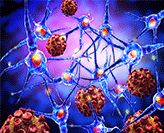MS researchers to explore environmental triggers
Hunter Medical Research Institute researcher Associate Professor Jeannette Lechner-Scott is investigating the environmental risk factors surrounding multiple sclerosis after receiving a $220,000 project grant from MS Research Australia.

In a previous study, Associate Professor Lechner-Scott and her team from Hunter New England Health and the University of Newcastle isolated blood cells from MS patients and healthy individuals and detected significant differences in a particular type of epigenetic process called DNA methylation.
The majority of these changes were clustered around the DNA region known to regulate the body's immune system. The new project will further assess the effect of these changes on the complex mechanisms of MS.
"This is one of the first methylation studies in MS and represents the next generation of research," Associate Professor Lechner-Scott said.
"Although genes can predispose you to developing autoimmune diseases like MS, it is important to know which mechanisms and factors can change your genetic destiny. With this grant we will study if methylation changes predict relapses or progression of disease."
Co-investigators include Professor Rodney Scott and Dr Rod Lea from HMRI, Associate Professor Helmut Butzkueven from the University of Melbourne, and Professor Bruce Taylor from the Menzies Institute for Medical Research in Tasmania. All are members of MS Research Australia's ANZgene consortium.
Recent studies have unearthed more than 110 genetic variants associated with MS, underlining the central role played by the immune system, while other known risk factors include exposure to sunlight and infections like the Epstein-Barr virus.
As incidence rates increase incrementally with distance from the equator, clinical trials are currently aiming to determine whether vitamin D supplements can help prevent MS, proving that a suspected environmental risk factor can be modified.
MS Research Australia CEO Dr Matthew Miles says the methylation project is at the forefront of understanding the cause of MS.
"This work will have vital implications for understanding what makes someone vulnerable to developing MS. It will also guide the future development of disease biomarkers to aid diagnosis and prognosis as well as pinpointing potential new treatment avenues," Dr Miles said.
* Jeannette Lechner-Scott is Senior Staff Specialist in the Department of Neurology at John Hunter Hospital and Conjoint Associate Professor with the University of Newcastle, researching in conjunction with the HMRI Brain and Mental Health program. HMRI is a partnership between the University of Newcastle, Hunter New England Health and the community.
Contact
- Media and Public Relations.
- Phone: 02 4921 5577.
Related news
- Enabling access and equity in higher education
- University-school partnership project seeks to lift student outcomes
- World-first platform to help understand how bushfire smoke harms the lungs and heart
- University of Newcastle Professor Appointed Chief Scientist for South Australia
- Foundation to fund research into secondary stroke prevention
The University of Newcastle acknowledges the traditional custodians of the lands within our footprint areas: Awabakal, Darkinjung, Biripai, Worimi, Wonnarua, and Eora Nations. We also pay respect to the wisdom of our Elders past and present.